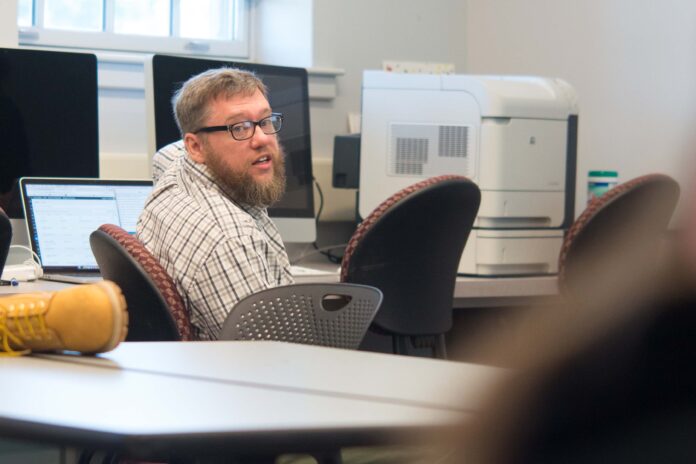Throughout the ongoing pandemic, tremendous strain has been placed on the education system. Professors who have spent their entire careers teaching in a classroom had to shift to being completely online and students who have spent most of their lives in lecture halls and in-person seminars switched to spending their days staring at a screen. Technology has proven to be extremely useful not only in education, but in all spheres of life during the pandemic.
Students and faculty have become increasingly aware of all sorts of technological resources. Tim Clarke, whose current role here began in 2016, had been a part of the Muhlenberg community for years before the pandemic. Clarke is a member of the Digital Learning Group, his official title is senior instructional design consultant. The Digital Learning Group functions as a drop-in center on the B-level of Trexler Library to help students, faculty and staff learn how to use different digital tools in an academic context. There are also digital learning assistants, who are students who have received extensive training in digital tools.
Clarke described his role in the Digital Learning Group saying, “Part of my job is to help faculty as a consultant to imagine how to… incorporate things like blogs, digital maps, podcasts, or different ways that students can engage with material and demonstrate their understanding that don’t just involve paper and pen.”
Clarke works in an inclusive way, acknowledging that all people have different levels of experience with technology. He stated, “I think it’s really a matter of practice and exposure, on the one hand, but also understanding why. I think that a lot of folks get presented with a piece of software or a piece of electronic equipment and that the expectation is stated, but the why is withheld.”
“I think it’s really a matter of practice and exposure, on the one hand, but also understanding why. I think that a lot of folks get presented with a piece of software or a piece of electronic equipment and that the expectation is stated, but the why is withheld.”
The complete shift to digital learning in spring 2020 was a stark one, and Clarke described this change from his perspective saying, “I think that we’ve asked a lot of our faculty, but the preparation that we had really happened rather quickly. I’m trying to also be as empathetic to those folks who have had to adapt very quickly under pretty unreal circumstances, who have developed a lifetime of craft in the classroom, and have now been asked to do something that is pretty different from what they’ve honed and developed over a long time.”
Clarke talked about how he is always there for students or faculty who are experiencing difficulty with the transition to increased digital learning. He also described how even though he does help with technology, he is primarily a designer and is there to help to design courses in any sense, not just in a technological context. Before there are conversations about specific technological resources, Clarke likes to facilitate conversations about the course as a whole, to get a complete view of the class.
The shift to digital learning has left lasting impacts on education, something that Clarke recognized saying, “The opportunity for flexibility around learning and instruction, I don’t think will ever leave us. I think that ultimately only opens up access to higher education.” In terms of classroom resources, he stated that, “There’s a whole other set of techniques that people can bring to their instruction.”
“The opportunity for flexibility around learning and instruction, I don’t think will ever leave us. I think that ultimately only opens up access to higher education.”
Continuing to speak on the pandemic in a larger context, Clarke described something he has learned from our technological experience during the pandemic saying, “What I’ve seen during the pandemic is affirming, in some ways, because when people are thoughtful, and they do the work, the ability to build and sustain communities online is real. I wonder what COVID-19 would have felt like if it had been [in 1998] instead of in 2019. The isolation that we would have felt, having been physically distant from one another, without modern information technology, would have been profoundly different.”






















